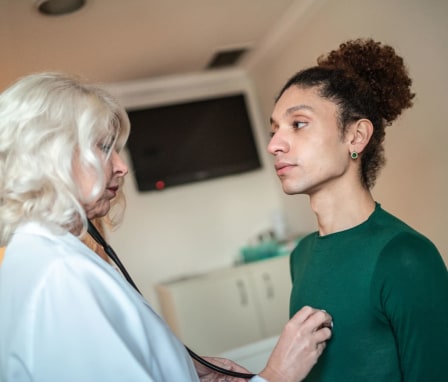Nursing Care for Transgender Patients: Tips and Resources

One responsibility of healthcare providers involves creating a welcoming and nonjudgmental environment for every patient. Still, transgender individuals — people whose gender is different than the one assigned at birth — and gender nonconforming (GNC) patients continue to face challenges and prejudice in healthcare settings.
Nurses have an especially important role in providing an affirming space for transgender people. Many patients confide in nurses, sometimes finding them more trustworthy than physicians. In fact, nursing has consistently ranked as the most honest and ethical profession for the past two decades, according to Gallup polls.
More and more nurses wish to provide a comfortable environment for all their patients, including those who are transgender or GNC. However, this can feel challenging for nurses without a great deal of experience caring for this community, especially because they have not had adequate or appropriate educational resources.
This guide aims to help nurses better understand the transgender and GNC community, the hurdles they might face in healthcare, and helpful steps on working with transgender and GNC patients.
Healthcare Barriers to Transgender Patients
For many transgender patients, healthcare can be an intimidating — and often inaccessible — environment.
Transgender people are more likely to be uninsured than cisgender patients, those who are gendered correctly at birth or those who are not transgender. This can restrict their access to healthcare with high costs. According to an analysis by the Kaiser Family Fund, 19% of transgender adults reported not possessing health insurance compared to 12% of the cisgender population. Another 19% reported encountering cost-related barriers to receiving care. Only 13% of cisgender adults encountered these barriers.
For instance, without the sensitivity and consideration needed to communicate concerns relating to transgender patients, some healthcare providers may accidentally out transgender patients to their families and friends, risking the patient’s health and safety.
In addition to emotional and financial barriers, transgender people also face outdated polices and processes modeled for heterosexual and cisgender patients.
According to Desiree Díaz, Ph.D., associate professor at University of Central Florida’s College of Nursing, these distressing experiences can lead to transgender people avoiding necessary appointments and procedures.
“Transgender patients often delay care due to past experiences when attempting to access care,” Díaz says.
Healthcare Biases and Discrimination
Often healthcare providers do not intentionally or maliciously misgender patients or make them feel alienated. The problem roots from broader systemic issues, meaning, among many things, that some nurses and other healthcare professionals have been socialized or taught to believe that being transgender or GNC is wrong so they might not want to treat or support trans and GNC patients.
Another systemic issue is that the healthcare system can disproportionately harm trans and GNC patients due to biases, stigmatization, and outdated policies. Even those who do wish to provide competent care do not necessarily have the training to adequately care for transgender patients.
Additionally, broad-based hostility and discrimination can limit the number of transgender and GNC people who pursue a nursing career which would bring lived experience to the field. Systemic issues have also resulted in a lack of research on transgender patients in healthcare.
—
“I believe that there are many nurses and providers who want to do the right thing and provide affirming care, but don’t have the support of their organization for training,” says Kristie Overstreet, Ph.D., who works as a clinical sexologist, psychotherapist, and LGBTQIA+ healthcare expert.
Greater education and training for working with transgender and GNC people is one solution to this problem. Another is acknowledging biases, then taking action to eliminate or lessen the potential harm those biases can cause.
For example, healthcare providers may make assumptions because of internal biases that can lead to mistakes about medical transitioning or taking sex and gender as the same. Some transgender people face more direct discrimination, such as providers refusing to treat them or calling them by a legal name they do not use because of the providers’ personal beliefs.
Considerations for Creating a More Supportive Environment
Once nurses understand their own biases and learn more about transgender and GNC individuals, they can take steps to provide affirming healthcare spaces for people in these communities. Remember: Each person and their individual situation is unique, so consider these considerations as general guidelines.
Understand and respect a patient’s body privacy.
“In general, it is not acceptable to ask about people’s genitals or gender-affirming surgeries or hormone therapy or other details about medical or nonmedical transition, or lack of transition,” explains Dasuqi.
If these details are directly relevant to a patient’s care, ask in a careful and sensitive manner. Do not share this information with other healthcare staff unless it is medically necessary.
“Healthcare staff should assume this information is very personal and should inform patients ahead of time when it will be necessary to share information about their body to other healthcare providers for the purpose of medical treatment,” Dasqui says.
Communicate in a way that does not distress your patient.
Ask open-ended questions, but make sure you do so in a direct but sensitive way. You can ask about a person’s gender, but be mindful how you ask about their sex.
“More direct questions that are relevant are often more appropriate,” Dasuqi advises, “such as ‘can you tell me more about what kind of genitalia you have and the symptoms you are experiencing there.'”
If you are unsure about something regarding a person’s gender, seek clarification instead of making assumptions.
Make note of your patient’s pronouns.
Make note of your patient’s pronouns.
Use the terms your patient uses when referring to themselves and their partner(s). Your patient may use he/him/his, she/her/hers, they/them/theirs — even if they present more stereotypically feminine or masculine. Others may use less common pronouns like ze/hir/hirs or ze/zir/zirs, so always ask before addressing them.
You can also make transgender and GNC patients feel more comfortable by introducing yourself with your own pronouns.
Be mindful when filling out healthcare forms.
“Because most forms still require healthcare workers to fill out the sex of an individual, they should know that this question can be painful or triggering for transgender and gender nonconforming individuals to answer,” says Dasuqi, adding that nurses and healthcare workers should be ready to offer support and understanding in these situations.
Sometimes, a patient’s name and gender may not match what is listed on their insurance or medical records. Should you need to cross-check a patient’s identification information, never ask what their “real” or given name is. Instead, the LGBT National Health Education Center recommends asking the patient what the name on their insurance is and confirming their date of birth and address, then continuing to address them by the name they originally provided.
Update your organization’s patient intake forms to include transgender and GNC options.
You can find a guide on how to do so here, and templates here from the National LGBT Health Education Center.
Administer care to the whole person.
As Overstreet says, “A patient’s gender identity is one part of them, so be sure to care for them as a whole person and not inflate or narrow their identity.”
In other words, consider a patient’s transgender or GNC identity within their larger cultural, emotional, physical, and psychological being.
“Cultural congruence is important when caring for all people but specifically the LGBTQ+ population,” Díaz adds. “This means understanding how culture pertains to … respecting the intersection.”
Finally, advocate on behalf of your patients.
If you hear your coworkers misgendering patients or making transphobic comments, do not be afraid to speak up. You can also be a patient advocate on issues like gender confirmation surgery and fertility treatments.
Key Terms and Concepts
Keep some key terms and concepts in mind when working with members of the LGBTQ+ community. The following list comes from Overstreet who has trained healthcare practitioners on best practices in LGBTQIA+ wellness and care. The list is not exhaustive, and terms may vary across communities and cultures. To learn about more terms, visit this resource from the Human Rights Campaign.
- Cisgender: Someone who is not transgender (‘cis’)
- Transgender: Someone who does not identify with their sex assigned at birth (‘trans’)
- Nonbinary: Someone who does not identify as exclusively a man or woman, identifies as a mix of genders, or has no gender at all; does not conform to gender expectations
- Crossdresser: Someone who wears clothing typical for a different gender
- Drag king or queen: Someone who performs for entertainment purposes (may or may not be transgender)
- Agender or genderless: No gender identity or expression (sometimes interchangeable with gender-neutral)
- Genderqueer: Someone who does not identify within the gender binary
- Bigender: Having two gender identities or expressions, either simultaneously, at different times, or in different situations
- Intersex: An “umbrella” term for someone who is born with general sex characteristics (genitals, gonads, and chromosome patterns) that do not fit typical binary male or female bodies; they have a wide range of bodily variations, which do not always show up at birth
- Lesbian: Female of any gender identity who is emotionally, romantically, or sexually attracted to other females
- Gay: A person who is emotionally, romantically, or sexually attracted to members of the same gender identity or expression (for example, a gay male or gay person)
- Bisexual: A person who is emotionally, romantically, or sexually attracted to more than one sex, gender, or gender identity; capacity for attraction for all genders (note: do not get confused with ‘bi’ which reinforces the binary)
- Queer: A multifaceted word that is used in different ways and has different definitions, including sexual and gender identities other than straight and cisgender
- Asexual: Lack of sexual attraction or desire for other people; may have romantic attraction
- Pansexual: Someone who has the potential for emotional, romantic, or sexual attraction to people of any gender identity or expression; this is a more inclusive term (note: “bisexual” and “pansexual” are not interchangeable for all people)
- Gender Dysphoria: A distressed state arising from the conflict between a person’s gender identity and the sex the person has or was assigned at birth
For more information, see our guide to LGBTQIA2S+ Key Terms and Definitions for Nurses and Healthcare Providers.
Creating More Equitable and Gender-Affirming Care in Nursing
“Health equity is the most important concept. It is about providing safe care to all people regardless of sexual preference, orientation, or identity,” Díaz says.
Equity within the healthcare space requires buidling a safe, nonthreatening environment for all patients, including those who are transgender. The ultimate goal, according to Dasuqi, is creating a healthcare system in which transgender patients would not have to worry about being treated like special cases.
“It is about shifting the systems and social conditioning on wider levels to include the trans and GNC experience as part of what is normal, rather than always an exception,” Dasuqi concludes.
Helpful Resources for Nurses
National LGBTQIA+ Health Education Center
The National LGBTQIA+ Health Education Center published Providing Affirmative Care for Patients with Non-binary Gender Identities. This guide offers practical advice for healthcare professionals on how to provide care for nonbinary patients. It includes an in-depth discussion on understanding nonbinary gender identities and using names and pronouns. The pamphlet also includes various scenarios so that doctors and nurses can read about how to address patients in an affirming way.Centers for Disease Control and Prevention
Published by the CDC, Patient-Centered Care for Transgender People: Recommended Practices for Health Care Setting is an online resource to help healthcare workers understand transgender people and their healthcare needs. The guide goes over issues of stigma, discrimination, and barriers to accessing care. It also provides patient-centered strategies in healthcare and lists terms that are outdated or offensive.National Clinician Consultation Center
This center provides expert materials and consultation to healthcare providers specifically about HIV/AIDS and other conditions like hepatitis C. Nurses and physicians who need clinical consultation or education on these topics can contact the center without charge. The center also offers easy-to-access clinical resources online.University of California, San Francisco – Transgender Care
UCSF Transgender is an arm of the UCSF Medical Center consisting of experts in transgender medicine. The programs Guidelines for the Primary and Gender-Affirming Care of Transgender and Gender Nonbinary People includes advice such as how to create a safe and welcoming space for transgender and gender nonbinary people. The guide also has information about specific topics like hormone therapy, menses in transgender men, and fertility options for transgender individuals. These in-depth guidelines are academically researched and free to access online.GLMA – Health Professionals Advancing LGBTQ Equality
This organizations mission statement involves ensuring the health equity of people in the LGBTQ+ community and promoting equality for LGBTQ+ healthcare professionals. GLMA publishes several transgender health resources, including facts about transgender peoples health and guidelines and learning modules for healthcare providers.
Meet Our Contributors

Kristie Overstreet, Ph.D., is a clinical sexologist, psychotherapist, LGBTQIA+ healthcare expert, host of the “Fix Yourself First” podcast, and author of “Fix Yourself First: 25 Tips to Stop Ruining Your Relationships.” She is the creator of The Transgender Dignity Model, which provides LGBTQIA+ training for healthcare professionals.
She has been featured in Forbes, Huffington Post, Cosmopolitan, New York Magazine, Oprah Magazine, The Washington Post, on CNN, and various other media outlets.

Ash Dasuqi, CPM, RN, is a trans genderqueer midwife, childbirth educator, critical care nurse, and parent. They created a trauma-informed, evidence-based childbirth preparation curriculum called the Embodied Birth Class that is open to all people while centering the experience of first-time pregnant and birthing queer/transgender individuals.

Desiree Díaz, Ph.D., is an associate professor of the University of Central Florida’s College of Nursing. One of the world’s first 22 certified advanced healthcare simulation educators, Díaz focuses her research on using the cutting-edge technology of simulation to improve the care for underserved patient populations in an effort to reduce healthcare disparities. Recognizing her contributions to nursing science and education, she has been inducted as a fellow of both the American Academy of Nursing and the Academy of Nursing Education.
Reviewed by:

A queer Asian gender-binary nonconforming parent, Angelique Geehan founded Interchange, a consulting group that offers anti-oppression support through materials and process assessments, staff training, and community building. Geehan works to support and repair the connections people have to themselves and their families, communities, and cultural practices.
She organizes as a part of National Perinatal Association’s Health Equity Workgroup, the Health and Healing Justice Committee of the National Queer and Trans Asian and Pacific Islander Alliance, the Houston Community Accountability and Transformative Justice Collective, the Taking Care Study Group, QTPOC+ Family Circle, and Batalá Houston.
Geehan is a paid member of our Healthcare Review Partner Network. Learn more about our review partners.
Related LGBTQ+ Resources
Feature Image: FG Trade / E+ / Getty Images




